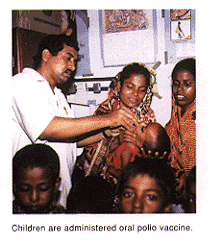Official Development Assistance (ODA)
Eradicating Polio in Bangladesh -- National Immunization Day
Polio, a disease that has largely disappeared in the industrialized world, is still all too common in Bangladesh and the citizens of that nation live in fear of this severe threat to their children's health. In 1995, the Government of Bangladesh set out to eradicate polio with a three-year program of simultaneous immunization of all Bangladeshi children aged five and under -- roughly 20 million children in all. On May 16, 1996, the program held its second annual National Immunization Day. Japan has supported this effort to stamp out polio by supplying vaccines and other necessary provisions.
Preparations for simultaneous immunizations begin over a month before the actual date. In order for the simultaneous immunization to succeed, it is essential to get word out to the mothers of the children to be immunized, and for this purpose volunteers -- including members of the Japan Overseas Cooperation Volunteer, -- visit women in their villages and present an easy-to-understand explanation of the relevant health and medical matters. The program also employs passenger vehicles, "rickshaws," in the villages as another means of publicizing the simultaneous immunization. With the assistance of millions of Bangladeshi citizens, polio vaccines has been made available throughout the nation. Surmounting a variety of obstacles and penetrating even areas with little or no transportation infrastructure, the program has managed to bring the vaccination to urban areas, farming communities, residential slums and, as a result, the simultaneous immunization effort has been judged a huge success nationwide.
Children's health is an indispensable factor in resolving the problem of unrestrained population growth. Japan is determined to continue to provide steady and active assistance that has a direct and positive impact on needy women and children.

